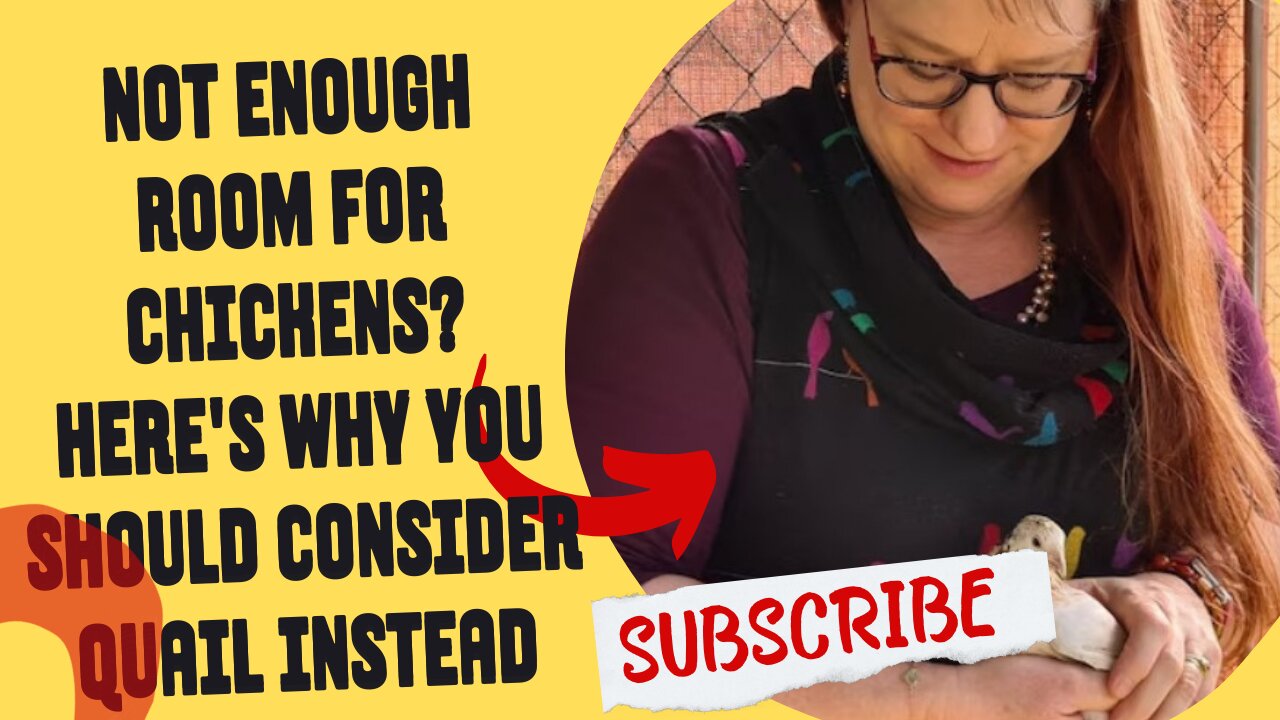Premium Only Content

Not enough room for chickens? Here's why you should consider quail instead
Not enough room for chickens? Here's why you should consider quail instead
If you're keen on the idea of having backyard birds to produce fresh eggs, but aren't keen on the mess and noise that can come with chickens, quail might be the pocket-sized solution for you.
As well as producing eggs, and meat for some, quail also provide hours of entertainment and free therapy.
Michelle Gitrap got her first quail in 2015 after she and her husband moved to Kettering in southern Tasmania.
"We bought four and that's how it started," she says.
She now has about 110 quail in a converted two-car garage space, producing and selling eggs to Hobart restaurants.
"They're just such wonderful characters and personalities … so inquisitive and full of life and personality."
Good for kids and beginners
Lis in Launceston has a much smaller flock of backyard quail, getting her first four just last year.
"Since then we've hatched two lots in the incubator ourselves, which has been lots of fun," she says.
"It's free entertainment for hours and hours just watching them all."
Lis says her small quail flock makes practically no noise and doesn't scratch up the backyard like chickens do.
"They're great for kids. They're not really a petting pet though," she says.
Why quail can be tiny-feathered therapists
Angela Darch remembered her family having quail when she was a kid, so she was keen to get her own for her property in Margate.
"Quail are very interactive birds, they're very social. There's lots of social learning that goes into just watching quail interacting," she says.
Angela and her husband built an aviary that's large enough for people to comfortably sit in, so that the space can be used as a quiet spot for contemplation and animal-based therapy.
"I work in child and adolescent mental health, so it really does help me, that intentional letting go on the day by checking in on the birds," she says.
Angela says watching quail can be helpful when she has clients who aren't interested in talking much, as it gives them something to focus on and can help spark conversation as they respond to what the quail are doing.
What to know about quail
Michelle, Lis and Angela all have coturnix quail, which is the most common species of domestic quail in Australia.
Quail are social birds that do best in a flock. If you're keeping just hens, you need at least three for them to be happy.
If keeping roosters with hens, it's very important to make sure you have at least four hens to every one rooster, otherwise the roosters can cause injuries and stress to the hens by hassling them.
In terms of space, it's generally recommended to have 1 square metre of space for every three birds.
Quail can start to lay eggs from six to 10 weeks old with a hen laying an egg a day in the warmer months.
Michelle says you need about four to five quail eggs for the equivalent volume of a chook egg, but as quail eggs have a higher yolk-to-white ratio, they tend to be creamier than the average store-bought chook egg.
Tips for keeping quail
Michelle, Lis and Angela say the first thing you need to consider before getting any quail is where you'll keep them.
You do need to have them in an area that's nice and protected, especially from rain and from the wind. They don't do very well if they get wet, especially if their feet get wet," Michelle says.
If startled, a quail can leap and fly straight up in the air. This means an enclosure either needs to be tall enough to have room to do that freely (tall enough for an adult human to stand in), or low enough so they can't get the momentum up (30–40cm).
Quail like to scratch around. So having a layer of straw, sawdust, or woodchips can be good if the enclosure is static, or you could also have the option of a movable home, like a chicken tractor, to move them around your yard to scratch in the dirt.
It's best to use small wire mesh to prevent rodents and snakes from getting in to eat the birds and to prevent the birds from squeezing out.
Build hidey holes for happy birds
Michelle uses baskets and buckets on their side to provide extra shelter, as hens will only lay their eggs in places where they feel safe.
Quail need a high-protein diet and won't eat up all your kitchen scraps like chickens can. They do need regular fresh greens in their diet, as well as shell grit or sand for their crops — a pouch near their throat which is used to store food.
They will eat bugs from your garden when they get access to them.
Giving them access to regular dust baths, using fine sand or wood ash, helps keep them happy and healthy.
While the birds might not want to be cuddled, they are inquisitive little creatures and may want to come and check you out and see what you're doing.
"You've got a little civilisation or society at your feet and you're just watching them and caring for them," Michelle says.
-
 LIVE
LIVE
DeVory Darkins
1 hour agoJeffries SCRAMBLES After National Gas Prices hit record low amid AFFORDABILITY CRISIS
11,025 watching -

The Quartering
1 hour agoSpam Calls Are Out Of Control, Candace Hits Rock Bottom & More Poison Food
2.04K5 -
 47:44
47:44
Tucker Carlson
1 hour agoRupert Lowe Warns of the Globalist Agenda Destroying the West and the Revolution Soon to Come
3.7K23 -
 LIVE
LIVE
Sean Unpaved
2 hours agoWill Miami Be "ODD MAN OUT" Of The College Football Playoff? | UNPAVED
104 watching -
 2:04:26
2:04:26
The Culture War with Tim Pool
3 hours agoWoke Has INFECTED Goth, Punk, & Metal, MAGA Must Save the Art | The Culture War Podcast
85.3K29 -
 1:12:25
1:12:25
Steven Crowder
2 hours agoCNN Declares J6 Pipe Bomber White & Nick Fuentes Interview Reaction
210K190 -
 LIVE
LIVE
Dr Disrespect
3 hours ago🔴LIVE - DR DISRESPECT - ARC RAIDERS - FREE LOADOUT EXPERT
1,373 watching -
 LIVE
LIVE
Rebel News
1 hour agoPublic Safety reviewing gun grab, Migrant offenders getting lighter sentences | Rebel Roundtable
307 watching -
 2:27
2:27
Buddy Brown
5 hours ago $0.49 earnedREDNECK JINGLE BELLS! | Buddy Brown
4981 -
 18:38
18:38
The Illusion of Consensus
1 hour ago $0.15 earned“Those are FIGHTING words” – Dave Smith SNAPS at Alex Over Holocaust Denial Accusations
3.17K1